Dix africains à Berlin – l’ultime étape de ‘Histoires Africaines’
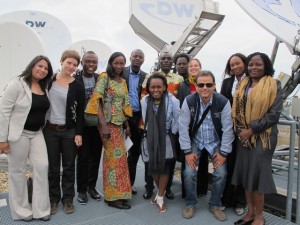 ” Ein, zwei, drei, …. Zehn. Ok tout le monde est là “, compte Stephie à l’entrée du métro sous le regard éberlué de tous, c’est-à-dire : Abiatou Oumarou du Benin, Khady Racine Diop du Sénégal, Elysée Ngindu Odia de la RDC, Madiha Boukal du Maroc, Ramata Konaté du Mali, Ibrahima Keita de la Guinée, Luigi Giovanni Temdie du Cameroun, Nestor Ebongo du Congo Brazzaville, Oumar Coulibaly du Burkina Faso et Taha Jemai de la Tunisie. Il s’agit des dix journalistes et techniciens audiovisuels venus à Berlin dans le cadre du projet ” Histoires Africaines “. Arrivés la veille, tous ont déjà subi le froid réfrigérant de l’été allemand. C’est donc bien équipé que la délégation africaine s’embarque pour une aventure à grande vitesse de 14 jours à Berlin.
” Ein, zwei, drei, …. Zehn. Ok tout le monde est là “, compte Stephie à l’entrée du métro sous le regard éberlué de tous, c’est-à-dire : Abiatou Oumarou du Benin, Khady Racine Diop du Sénégal, Elysée Ngindu Odia de la RDC, Madiha Boukal du Maroc, Ramata Konaté du Mali, Ibrahima Keita de la Guinée, Luigi Giovanni Temdie du Cameroun, Nestor Ebongo du Congo Brazzaville, Oumar Coulibaly du Burkina Faso et Taha Jemai de la Tunisie. Il s’agit des dix journalistes et techniciens audiovisuels venus à Berlin dans le cadre du projet ” Histoires Africaines “. Arrivés la veille, tous ont déjà subi le froid réfrigérant de l’été allemand. C’est donc bien équipé que la délégation africaine s’embarque pour une aventure à grande vitesse de 14 jours à Berlin.
![]() read more
read more
Children’s television: Is it ok to break things on TV?
Three young Dutch boys dismantle an old industrial scale in a backyard. The kids use dad’s toolbox and take the old potato scale apart, exploring the individual parts and finding out how it works. At the end they leave it and run to play.
The documentary-series Toolbox Kids Uit me kaar on children exploring disused appliances is a success in The Netherlands. However, for television producers from Kenya and Ghana it might be unthinkable to let children “destroy” something that is still working as an idea of educational TV for children.
![]() read more
read more
Tips for writing so readers keep reading
 Good writing requires more than just talent. As with any craft, there are techniques you can learn. Luna Bolivar has been writing and copyediting for years. Here are some of her pointers for producing great copy.
Good writing requires more than just talent. As with any craft, there are techniques you can learn. Luna Bolivar has been writing and copyediting for years. Here are some of her pointers for producing great copy.
![]() read more
read more
Training mobile journalism – more than just apps (Part 1)
Using a mobile phone effectively for reporting is becoming more established in newsrooms.
And along with the ever increasing range of applications, journalism training and media development agencies are turning their attention to offering mobile journalism courses and mobile content producing courses for citizen media.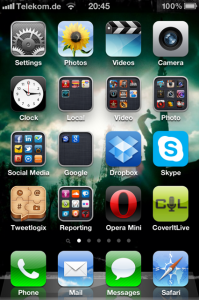
This is positive. But there are plenty of traps along the way in offering mojo training.
Here on the DW Akademie Africa blog, we’re always keen to explore multimedia apps and innovative ways journalists can use a mobile phone for their work.
In the first of two blog posts, we’ll take a look at some points journalism trainers should consider when setting out to develop mobile journalism courses.
![]() read more
read more
Ghana radio stations getting to know their listeners
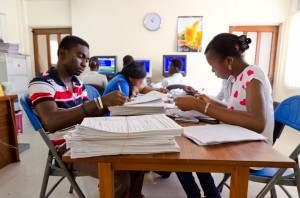
What is your most preferred radio station? At what times do you listen to radio? And what topics are you most interested in hearing on the radio?
If you’re living in one of the Ghanaian cities and towns with broadcasters participating in the new Our Radio! project, somebody might come to your doorstep to ask these questions. Audience research is underway.
A total of 1700 interviews are being conducted, two to three hundred in each of the regions where one of the nine radio station partners in the project is located.
Trained research interviewers have a questionnaire with around 50 questions for randomly selected respondents designed by the research organization Pragma Solutions. It was tailored to the needs of the radio stations by station managers at a research workshop held in May.
![]() read more
read more
Our Radio! – working with radio stations in Ghana
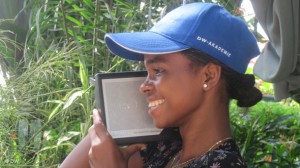 “Our Radio!” is a cooperation project between the German Agency for International Cooperation (GIZ), DW Akademie and the Ghana Independent Broadcasters’ Association (GIBA).
“Our Radio!” is a cooperation project between the German Agency for International Cooperation (GIZ), DW Akademie and the Ghana Independent Broadcasters’ Association (GIBA).
![]() read more
read more
Vox Pop: What’s good and bad about this journalistic format?
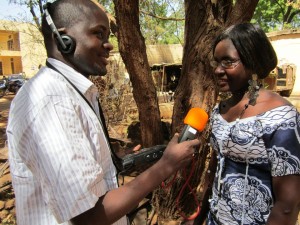 Radio and TV programs are not an end in themselves – journalists don’t produce them for their own self-fulfillment, but to meet the needs of their audience. Journalists write news bulletins and reports to meet the audience’s information needs and they produce music programs to entertain their audience.
Radio and TV programs are not an end in themselves – journalists don’t produce them for their own self-fulfillment, but to meet the needs of their audience. Journalists write news bulletins and reports to meet the audience’s information needs and they produce music programs to entertain their audience.
All of these journalistic formats have one thing in common: they are produced and presented by professionals. And the other voices that appear in the sound clips are most often those of politicians, experts or high-ranking people.
The average citizen hardly ever appears on the air – unless the program uses vox pop. This expression is short for the Latin term, “vox populi” and means “the voice of the people”. When this “voice of the people” is heard, the audience knows that “normal people”, very much like themselves, also have a place in broadcasting. They feel appreciated and taken seriously by the radio or TV station. And this in turn strengthens the audience’s “loyalty” to the station.
For a “vox pop”, journalists ask a number of randomly selected people the same question, collect the answers and string them together. The different answers create an idea of the variety of opinions existing within the population.
Journalists usually conduct these “one-question interviews” in public places where you can find many different kinds of people.
![]() read more
read more
A small, great story
The surprising outcome of a documentary workshop by DW Akademie’s Asia division
The best stories can be found on the street. That’s a well worn saying but it’s true – at least in the eyes of a documentary filmmaker. Some of DW Akademie’s trainees discovered one of those stories waiting in Ho Chi Minh City, Vietnam.
She’s the “sweet soup seller” and you can’t miss her. She sets up shop outside the broadcasting center and we always see her during our workshop breaks. She packs everything she needs for her “mobile restaurant” in big baskets balanced on a bamboo pole – typical for Vietnam street vendors. Her specialties are sweet snacks and desserts …
It’s more than obvious that the staff at the state TV broadcaster VTV loves her sweet soya broth, green and brown beans cooked in sugar, mango puree with ice and homemade lime custard. At lunchtime her colorful plastic stools quickly fill up and her numerous pots overflow with ingredients. The customer-service concept behind the portable dessert bar corresponds to the well-established western coffee shops and fast food chains in the country: you can have your goodies on the spot or for take away – in a handy plastic cup with a spoon and small bag.
We decide that this hardworking, talkative woman is perfect for one of our hands-on exercises. On the second day of our “Short Documentaries” workshop some participants spend an afternoon observing her with the camera. So far, there’s no storyboard or script: participants have to shoot simple actions in short sequences: A mango puree with ice in three cuts.
![]() read more
read more
Research and production plan for multimedia stories
Imagine you are just finishing a story or blog post and suddenly realize that some crucial piece of information is missing.
Or maybe you only notice now that you forgot to take a picture of one of the people you interviewed.
Something is missing that you should have arranged to get early in the research process that you can no longer get at this late hour.
We’ve probably all experienced such nightmares. Yet they are so easy to avoid with a little bit of careful planning.
![]() read more
read more
Action learning in Laos
DW Akademie trainer Daniel Hirschler sends this report from a workshop in Laos.
As a trainer, I like working with what I call “action learning settings”. This basically means designing the workshop in a way that learning happens in a good mix of experiencing something and then talking about it and reflecting upon the experience.
Workshop designs are like recipes for cooking: It’s not just the amount of the ingredients that counts, it’s also their quality. And as with any recipe, things can work out perfectly, but they can also go terribly wrong. So for a trainer, going into an action learning workshop can be fraught with tension. Will things work out? What if they don’t…?
![]() read more
read more




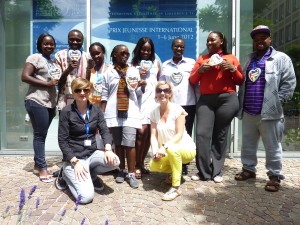
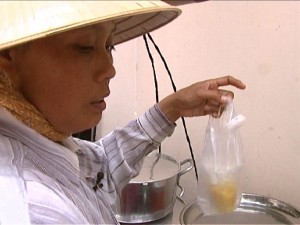
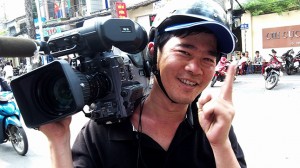
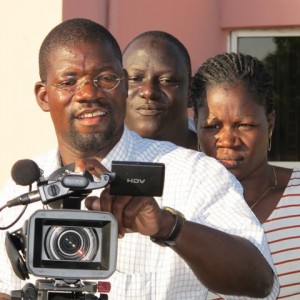
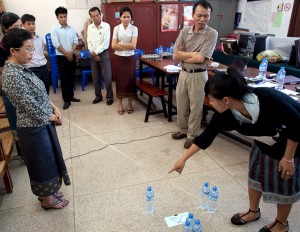




Feedback